
Назар аударыңыз. Бұл материалды сайт қолданушысы жариялаған. Егер материал сіздің авторлық құқығыңызды бұзса, осында жазыңыз. Біз ең жылдам уақытта материалды сайттан өшіреміз
Жақын арада сайт әкімшілігі сізбен хабарласады
қысқа мерзімді сабақ жоспарларын
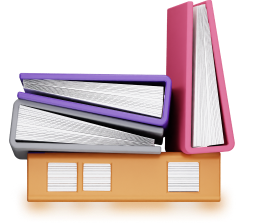
МЕТОДИЧЕСКИЕ РЕКОМЕНДАЦИИ ПО ФОРМИРОВАНИЮ У УЧАЩИХСЯ НАВЫКОВ ФУНКЦИОНАЛЬНОЙ ГРАМОТНОСТИ НА УРОКАХ МАТЕМАТИКИ

Дипломдар мен сертификаттарды алып үлгеріңіз!


Материалдың толық нұсқасын
жүктеп алып көруге болады
A.Zh. Slemgalieva
L. N. Gumilyov Eurasian National University,
Republic of Kazakhstan, Astana
METHODOLOGICAL RECOMMENDATIONS FOR THE FORMATION OF STUDENTS' FUNCTIONAL LITERACY SKILLS IN MATHEMATICS LESSONS
The article explores the role of mathematics in human life, the importance of mathematical literacy and various technologies for its improvement, including development technologies through critical thinking.
The article is devoted to the concept of "functional literacy", which "defines and understands the role of mathematics in the world in which a person lives, and expresses correct judgments and the ability to use mathematics to meet current and future needs for creativity, interests and thinking. In accordance with this, the need to focus on testing the ability of students to apply mathematical knowledge in various situations requiring different approaches, thoughts and feelings is justified.
As a result of the research process, a demo-stationary version of diagnostic work was developed, which determines the functional literacy of 5th grade students.
The conclusion emphasizes the need for a significant amount of mathematical knowledge and skills that do not interfere with the knowledge of mathematical facts, terminology and the implementation and application of standard actions.
Keywords: functional literacy, natural science literacy, reading literacy, mathematical literacy, financial literacy.
Introduction
Currently, analyzing the current trends in social development, we can come to the conclusion that the problem of the quality of education is becoming increasingly relevant. This is due to the fact that modern constantly and chaotically developing society is increasingly in need of versatile people who would have developed the ability to collect, analyze, process and apply the information received. The image of a graduate of a modern school must meet the conditions of the adult world, which expects a personality formed in different areas.
The graduate should have the ability to independently solve issues and put forward new ideas, the skill of finding the most suitable solution from a variety of options for solving problematic situations set before him.
Students' skills and abilities can be formed in the course of project and research work. In the course of research, students develop knowledge, skills and abilities to solve previously unknown tasks.
Today, the ability to independently find, analyze, apply information and quickly respond to all changes in life comes out in the first place - as a global need. The main thing is functional literacy, as it is "a person's ability to solve standard life tasks in various spheres of life and activity based on applied knowledge".
Materials and methods
There is an international program for assessing students' educational achievements (PISA), which monitors the quality of knowledge that modern schoolchildren receive from around the world, and also ensures that modern school education gives students the necessary set of knowledge and skills necessary for a full life in modern society.
The evaluation of educational achievements in the PISA study is aimed at studying the four main types of functional literacy, which are presented in Table 1.
Table 1 – The main types of functional literacy
|
Type of functional literacy |
Characteristic |
|
1. Reading literacy |
It consists in the ability to recognize, use and evaluate various texts, think about their content and read in order to understand everything that native speakers of the same language want to convey to the reader, and, as a result, be able to interact with society and participate in its life. Also, reading is one of the main and decisive factors that allow you to expand your own knowledge in any field of modern science and culture |
|
2. Mathematical literacy |
It consists in the fact that a person is able to explain certain phenomena based on formulas that he can independently apply and interpret mathematics by means of different contexts, namely, through personal, social, professional and scientific. This ability helps a person to reason, explain and predict various phenomena in the world. Mathematical literacy helps humanity to determine the place of mathematics as a science in the modern world |
|
3. Financial literacy |
It consists in the fact that a person understands key financial concepts and uses this information to make important and reasonable decisions that contribute to economic security and well-being of people, as well as provide an opportunity to participate in the economic life of the country |
|
4. Natural science literacy |
It consists in the fact that a person has been learning and cultivating knowledge about nature and its laws for many generations, which are now commonly called natural science. Natural science literacy is necessary for the discovery of new knowledge by mankind, as well as for their subsequent explanation and, based on the available data, the formulation of mathematical and other laws, phenomena and principles |
From the point of view of mathematical literacy , the task is characterized by the following structural components:
1) the ability to find and select information;
2) perform arithmetic operations and use them to solve specific problems;
3) interpretation, evaluation and analysis of data.
From the point of view of reader literacy , the task is characterized by the following structural components:
1) reader's content that examines the main types of texts;
2) the context of the task, which examines the elements of the environment familiar to students;
3) competence-based assessment area that considers reader actions.
From the point of view of financial literacy , the task is characterized by the following structural components:
1) financial content that addresses the main types of financial topics;
2) the context of the task, which examines groups of situations familiar to students;
3) competence-based assessment area, which describes cognitive activity and mental strategies, and approaches in the field of finance.
From the point of view of natural science , it is characterized by such structural components:
1) natural science content that considers the main types of knowledge;
2) the context of the task, which examines the elements of the environment familiar to students;
3) competence-based assessment area that considers natural science activities.
PISA research conducts diagnostic work in the main school cyclically, every three years, which includes tasks on the formation of mathematical, natural science and reading literacy. Tasks for the formation of functional literacy should correspond to certain skills presented in Table 2.
Table 2 –Skills assessed by the PISA study
|
Mathematical literacy |
Reading literacy |
Financial literacy |
|
• Formulate the situation in the language of mathematics • Apply mathematical concepts, facts and procedures • Interpret and evaluate mathematical results |
• Find and extract information from text • Integrate and interpret text • Comprehend and evaluate the text • Use information from the text |
• Identification of financial information • Analysis of information in a financial context • Assessment of the financial problem • Application of financial knowledge |
Results and discussion
According to the considered skills on various types of functional literacy, diagnostic work was compiled and carried out.
The purpose of the diagnostic work: to assess the level of mathematical, reading and financial literacy, as components of functional literacy, in 5th grade students.
|
Student Guide The written work consists of two tasks, each task describes one case. There are two questions in the first task, one in the second. Only 3 questions. The set time for completing the task is 20 minutes. The answers to the tasks are given in different formats. When answering a question with a short answer, write the answer in a specially designated place after the words "answer". There are questions in the work that need not only to be answered, but also to write a solution or comment. These tasks say "write down the solution", "prove", "explain". Good luck! |
|
Complete tasks 1-2 |
Task №1. "Flash drive".
A USB flash drive is a compact electronic storage device.
Ernur has a flash drive on which he stores music and photos. Its volume is 1 GB (1000 MB). The graph below (see Figure 1) shows the current state of the memory of this USB drive.
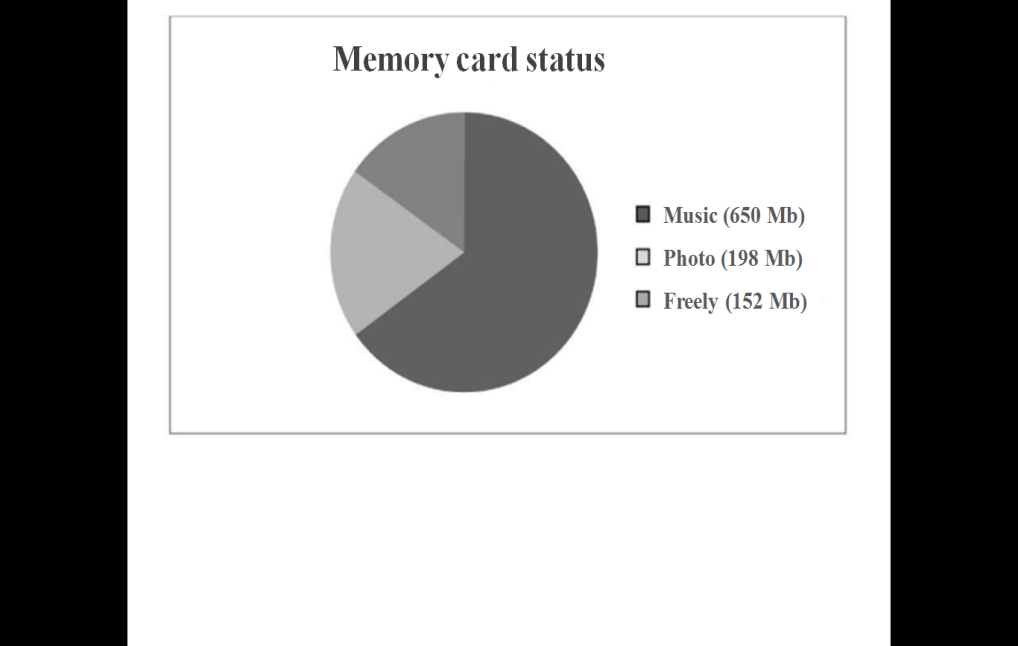
Figure 1
Question 1. Ernur is going to
transfer a  MB photo album to his
USB flash drive, but there is not enough free space on it. He
doesn't want to delete existing photos, but he will gladly delete
one or two music albums. Ernur has music albums of the following
size stored on a flash drive.
MB photo album to his
USB flash drive, but there is not enough free space on it. He
doesn't want to delete existing photos, but he will gladly delete
one or two music albums. Ernur has music albums of the following
size stored on a flash drive.
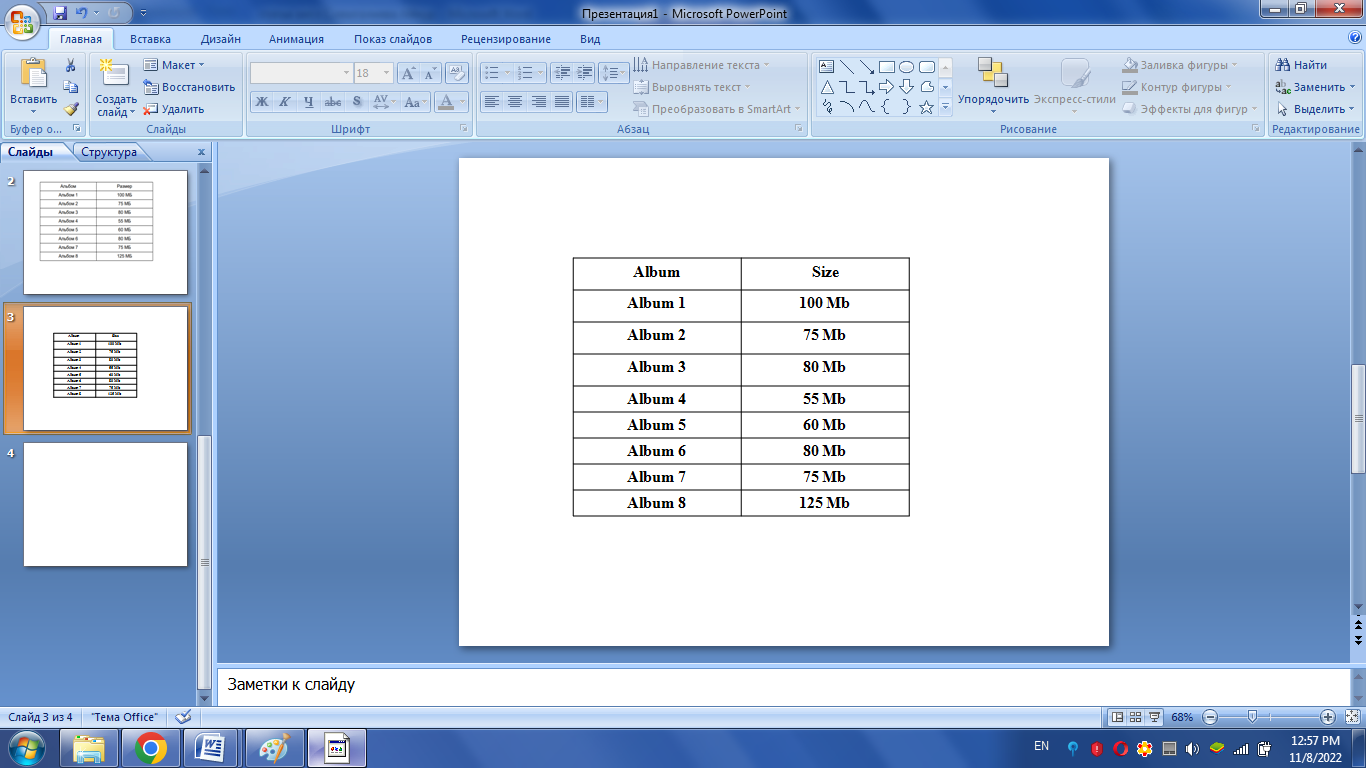
Figure 2
If Ernur deletes no more than two music albums, will there be enough space on his USB stick to add a photo album? Circle "Yes" or "No" and show the calculations justifying your answer.
Answer: Yes / No_____________________________________________
____________________________________________________________
USB flash drive: EVALUATION OF THE ANSWER TO QUESTION 1
THE PURPOSE OF THE QUESTION
-Description: Compare and calculate values to meet the specified criteria.
-Area of mathematical content: quantity.
-Context: personal.
-Cognitive activity: interpretation.
The answer is accepted in full
-YES, any example of a combination of two albums that occupy 198 MB or more is given.
Possible answers.
•
He needs to
delete  MB
(
MB
( ) so that he can erase
any two music albums that take up more than
) so that he can erase
any two music albums that take up more than
 MB, for example,
albums
MB, for example,
albums  and
and
 .
.
•
Yes, he can delete albums 7
and 8, which will free up  MB of
memory.
MB of
memory.
The answer is not accepted
- Other answers.
- There is no answer.
Question 2. During the following weeks, Ernur deletes some photos and music, and also adds new photos and music files. The current state of the USB memory is shown in the table below.
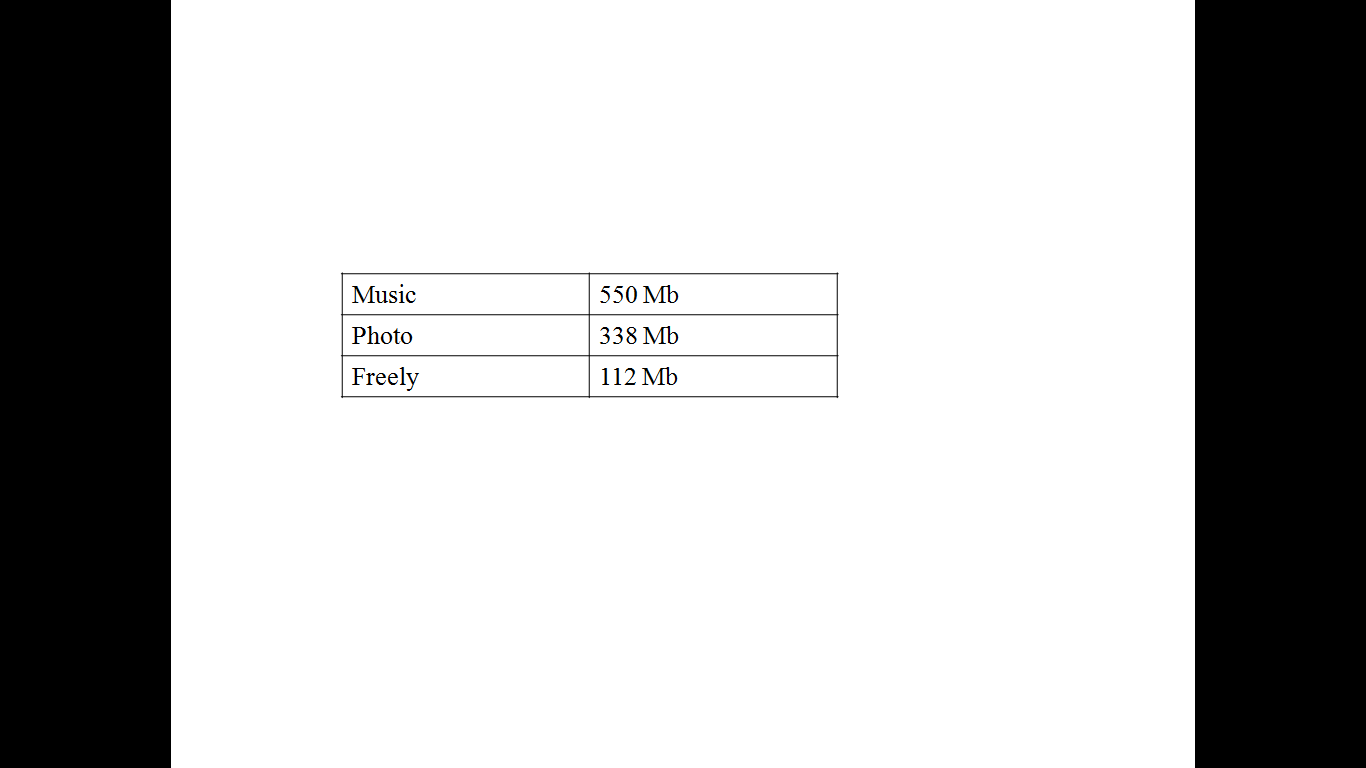
Figure 3
His brother gives him a new 2
GB ( MB) flash drive, which
is completely free. Ernur transfers the contents of his old flash
drive to a new one. Which of the following graphs (see Fig. 4)
Displays the current memory status of the new USB
drive? Circle A, B, C or D.
MB) flash drive, which
is completely free. Ernur transfers the contents of his old flash
drive to a new one. Which of the following graphs (see Fig. 4)
Displays the current memory status of the new USB
drive? Circle A, B, C or D.
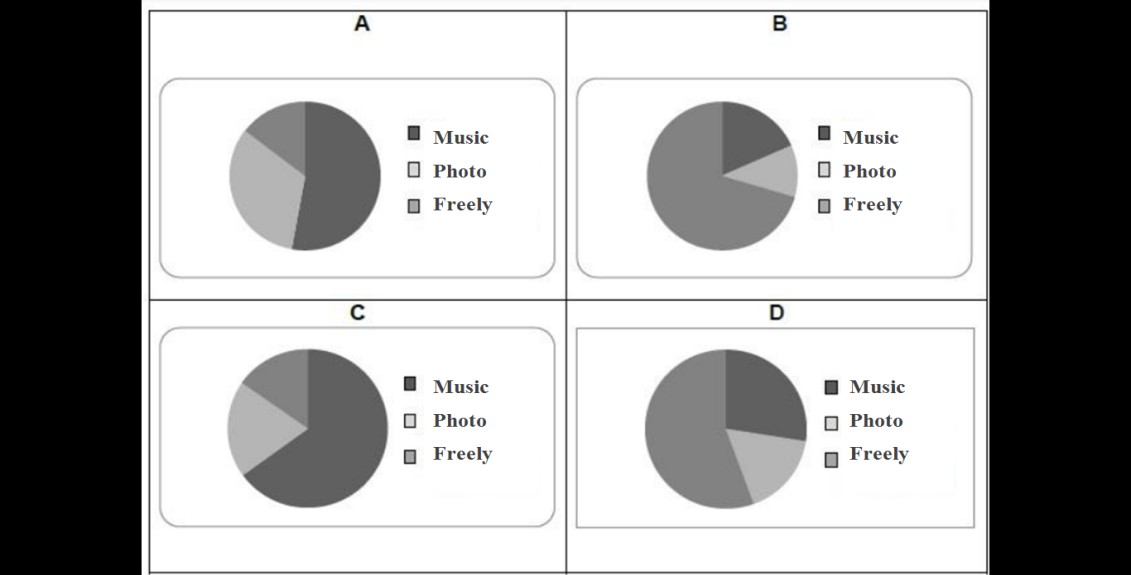
Figure 4
USB flash drive: EVALUATION OF THE ANSWER TO QUESTION 2
THE PURPOSE OF THE QUESTION
-Description: to understand the relationship of the problem language with the symbolic, formal language necessary for its mathematical representation.
-Area of mathematical content: uncertainty and data.
-Context: personal.
-Cognitive activity: interpretation.
The answer is accepted in full
-D
The answer is not accepted
- Other answers.
- There is no answer.
Task №2. "Buying an apartment"
This is the plan of the apartment that Marat's parents want to buy through a real estate agency (see Fig. 5).
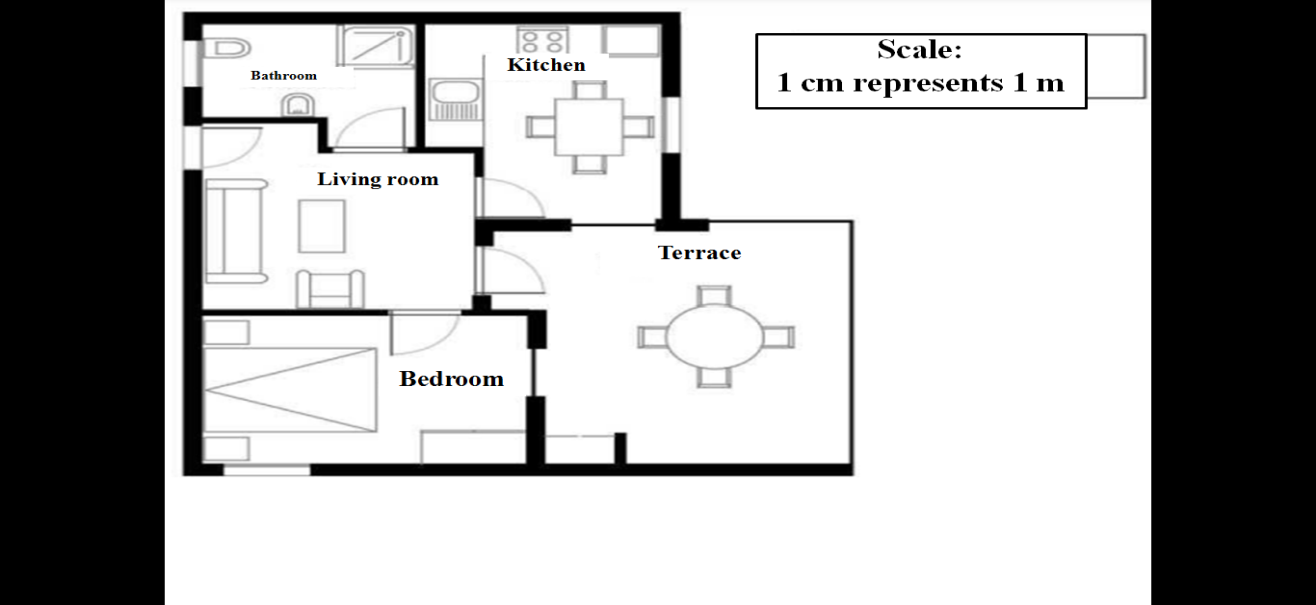
Figure 5
Question 1. To calculate the total area of the apartment (including the terrace and walls), you can measure the size of each room, calculate the area of each of them and add up all the areas.
However, there is a more efficient method in which only 4 segments need to be measured to calculate the total area of the apartment. Indicate on this plan the four segments that need to be measured to calculate the total area of the apartment.
Answer:_____________________________________________________
Explanation:__________________________________________________
BUYING AN APARTMENT:
EVALUATION OF THE ANSWER TO QUESTION 1
THE PURPOSE OF THE QUESTION
-Description: use spatial thinking to show on the plan (or in another way) the minimum number of sides whose length is needed to determine the area of the apartment.
-Area of mathematical content: space and form.
-Context: personal.
-Cognitive activity: formulate.
The answer is accepted in full
- The plan shows the four dimensions necessary to calculate the area of the apartment. There are 9 possible solutions, which are shown below in the figures (see Figure 6).
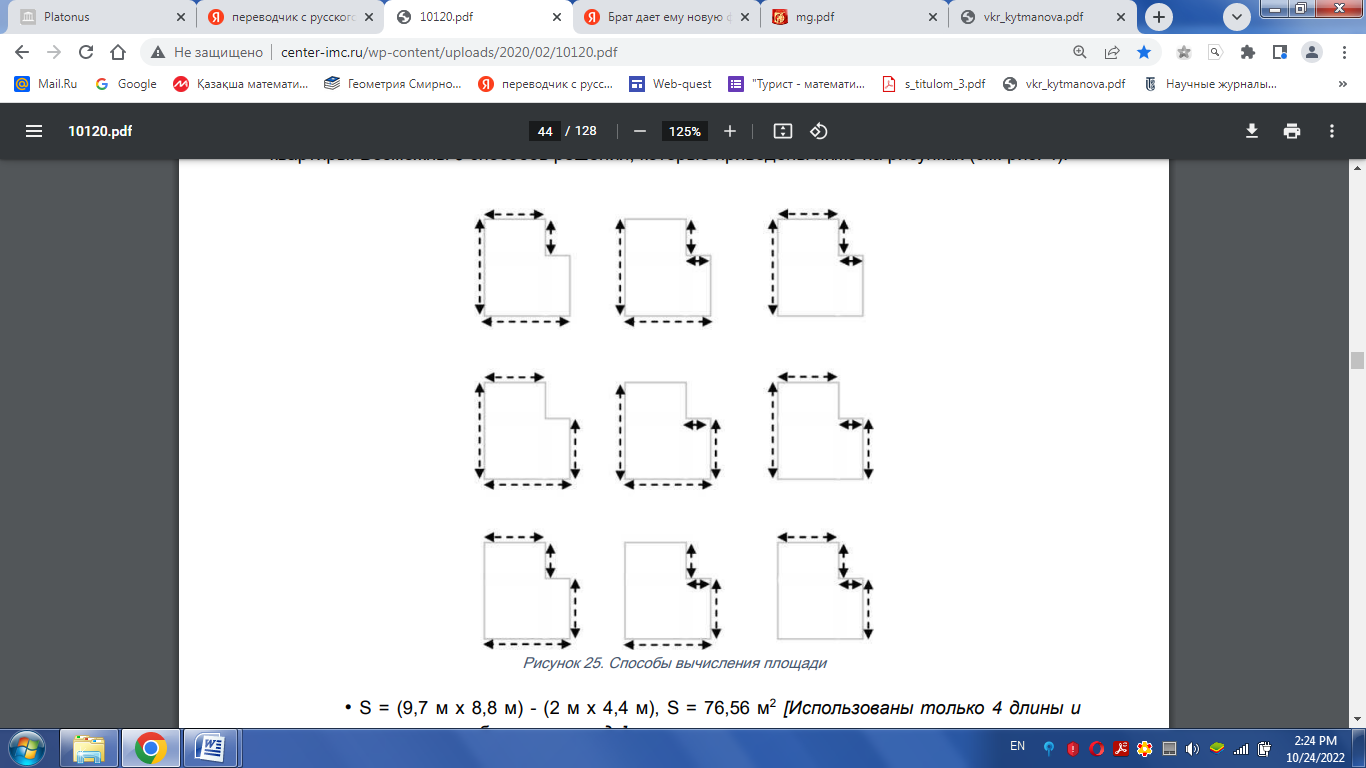
Figure 6
•
 ,
,  [Only 4 lengths were
used and the required area was
calculated].
[Only 4 lengths were
used and the required area was
calculated].
The answer is not accepted
- Other answers.
- There is no answer.
Conclusions
The teacher should form the scientific level of the student's creative work, create new values, searches. For the teacher, achieving the result is not only that the student has knowledge, but also to gain knowledge independently and apply the acquired knowledge as needed. Teaching today is the new world of tomorrow.
Teachers are reference points in teaching modern methods of new technologies. Students should, if possible, independently adapt to a new life, new learning, new relationships. We should not forget that in the process of becoming one of the developed countries that meet this trend, teachers are assigned great tasks.
Effective use of new technologies is necessary to implement the content of teaching mathematics. The development of students' independent work skills in mathematics lessons is one of the significant achievements of a mathematics teacher. In order to form a personality that can independently check exercises and draw conclusions, it is necessary to widely use the methods of new technologies.
In order to improve the teaching of mathematics, it is advisable to further develop new methods for using non-standard tasks. Such tasks encourage students to make independent decisions and develop logical thinking.
Fascinating and rational is the lesson, which presents a variety of riddles of mathematics, interesting phenomena of the world of numbers, elements of the game. Only if there is an interest in the subject, the student begins to listen and study it in depth. It is known that a student interested in the subject has a high quality of knowledge. And the ability to adequately apply the knowledge, skills and abilities acquired by students from one subject to other close subjects, critical thinking and comparison - help to achieve the goal independently.
LIST OF SOURCES USED
1 Roslova L.O., Krasnianskaya K.A., Kvitko E.S. Conceptual foundations of the formation and evaluation of mathematical literacy. Domestic and foreign pedagogy. – 2019. – T. 1. – № 4 (61). – pp. 58-79. 6.
2 Ivanova, T.A. The structure of shkolnikov's mathematical literacy in the context of the formation of their functional literacy/ T.A.Ivanova, O.V.Simonova // Bulletin of Vyatka State University for the Humanities. - Kirov, 2009. - No. 1. p. -125-129.
3 Esenbayev T.Zh. Okushylardyn functionaldyk matematikalyk sauattylygyn damytuga arnalgan tapsyrmalar zhinagi. - Kyzylorda, 2014.
4 Kovaleva G.S., Krasnovsky E.A., Krasnokutskaya L.P., Krasnianskaya K.A. International PISA Program examples of tasks in reading, mathematics and natural science. - 2018. 106 p.
5 Clarin, M. Pedagogical technologies and innovative trends in modern education (foreign experience)/ M. Clarin// Innovative movement in Russian school education. - M., 2017. - p. 337.
6 Ivanov, D.A., Mitrofanov, K.G., Sokolova, O.V. Competence approach in education. Problems, concepts, tools. Educational and methodical manual/ D.A. Ivanov, K.G.Mitrofanov, O.V. Sokolova,.-M.: APKiPPRO, 2018.-101 p.
7 Kemelbekova, G.A. Features of the formation of functional literacy of students in the subjects of the humanities cycle / G.A. Kemelbekova. - Krasnodar : Novation, 2016. - pp. 6-9.
8 Krupnik, S.A. Functional literacy in the education system of Belarus. / S.A. Krupnik, V.V. Matskevich. - Minsk : APO, 2003. - 125c.
9 Perminova, L.M. Formation of functional literacy of students: cultural approach: textbook.- method. manual) L.M. Perminova. - Moscow: Moscow Institute of Open Education, 2009. - 131 p.
10 Perminova, L.M. The minimal field of functional literacy (from the experience of the St. Petersburg school)/ L.M.Perminova//Pedagogy. - 1999. - No. 2. - pp. 26-29.
СПИСОК ИСПОЛЬЗОВАННЫХ ИСТОЧНИКОВ
-
Рослова Л.О., Краснянская К.А., Квитко Е.С. Концептуальные основы формирования и оценки математической грамотности. Отечественная и зарубежная педагогика. – 2019. – т. 1. – № 4 (61). – с. 58–79. 6.
-
Иванова, Т.А. Структура математической грамотности школьникова в контексте формирования их функциональной грамотности/ Т.А.Иванова, О.В.Симонова // Вестник Вятского государственного гуманитарного университета. - Киров, 2009. - №1. С. -125-129.
-
Есенбаев Т.Ж. Оқушылардың функционалдық математикалық сауаттылығын дамытуға арналған тапсырмалар жинағы. - Қызылорда, 2014.
-
Ковалева Г.С., Красновский Э.А., Краснокутская Л.П., Краснянская К.А. Международная программа PISA примеры заданий по чтению, математике и естествознанию. - 2018. 106 с.
-
Кларин, М. Педагогические технологии и инновационные тенденции в современном образовании (зарубежный опыт)/ М. Кларин// Инновационное движение в российском школьном образовании. - М., 2017. - с. 337.
-
Иванов, Д.А., Митрофанов, К.Г., Соколова, О.В. Компетентностный подход в образовании. Проблемы, понятия, инструментарий. Учебно-методическое пособие/ Д.А. Иванов, К.Г.Митрофанов, О.В. Соколова,.-М.: АПКиППРО, 2018.—101 с.
-
Кемельбекова, Г.А. Особенности формирования функционально грамотности учащихся по предметам гуманитарного цикла / Г.А. Кемельбекова. - Краснодар : Новация, 2016. - С. 6-9.
-
Материалды жүктеу
Материал ұнаса әріптестеріңізбен бөлісіңізМатериал жариялап тегін сертификат алыңыз!Бұл сертификат «Ustaz tilegi» Республикалық ғылыми – әдістемелік журналының желілік басылымына өз авторлық жұмысын жарияланғанын растайды. Журнал Қазақстан Республикасы Ақпарат және Қоғамдық даму министрлігінің №KZ09VPY00029937 куәлігін алған. Сондықтан аттестацияға жарамды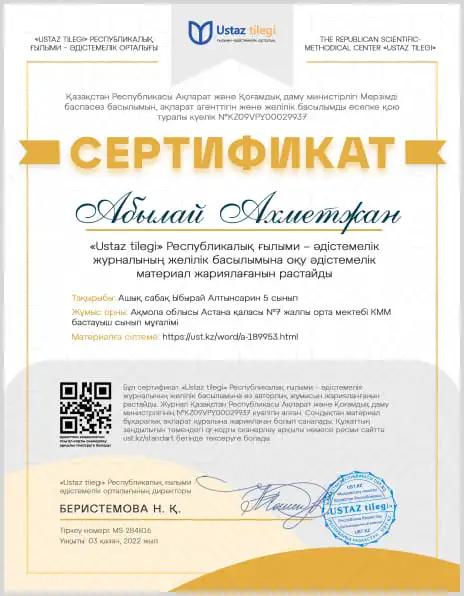
Сіз үшін 400 000 ұстаздардың еңбегі мен тәжірибесін біріктіріп, ең үлкен материалдар базасын жасадық. Төменде пәніңізді белгілеп, керек материалды алып сабағыңызға қолдана аласыз
 Дайын ҚМЖ. Барлық пәндерден 2022-2023 оқу жылына, жаңа бұйрыққа сай жасалған
Дайын ҚМЖ. Барлық пәндерден 2022-2023 оқу жылына, жаңа бұйрыққа сай жасалған